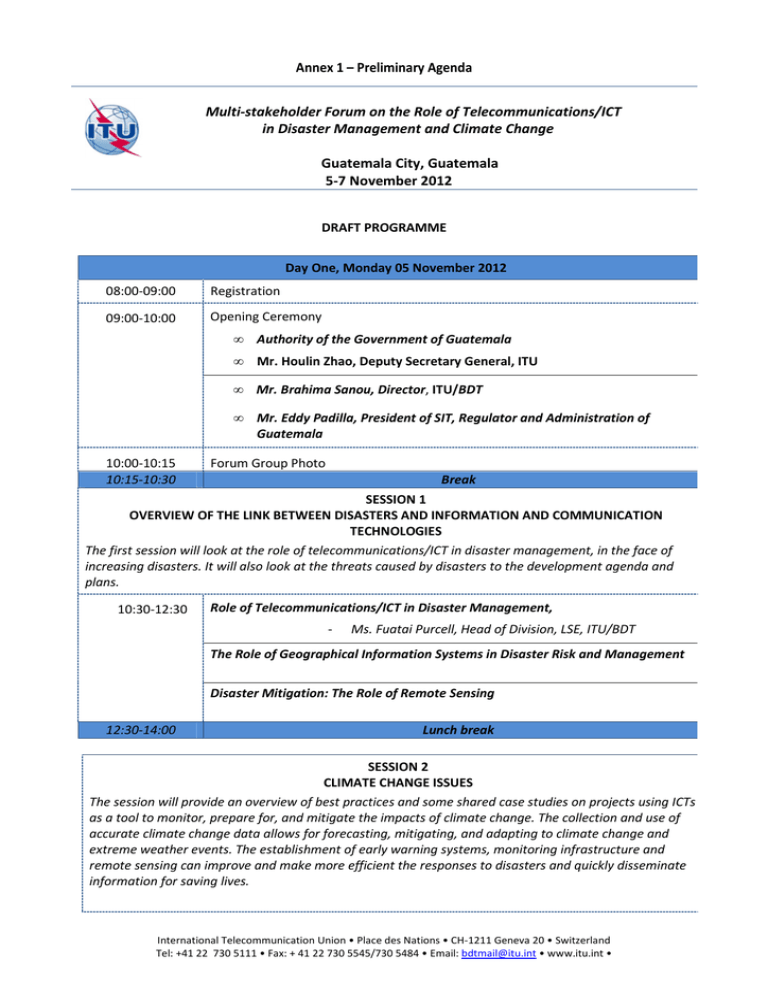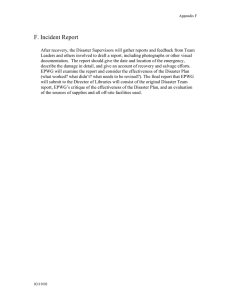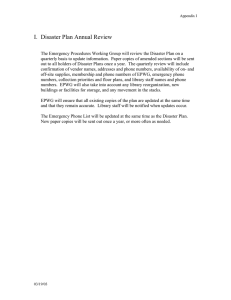Document 13162101
advertisement

Annex 1 – Preliminary Agenda Multi-stakeholder Forum on the Role of Telecommunications/ICT in Disaster Management and Climate Change Guatemala City, Guatemala 5-7 November 2012 DRAFT PROGRAMME Day One, Monday 05 November 2012 08:00-09:00 Registration 09:00-10:00 Opening Ceremony 10:00-10:15 10:15-10:30 • Authority of the Government of Guatemala • Mr. Houlin Zhao, Deputy Secretary General, ITU • Mr. Brahima Sanou, Director, ITU/BDT • Mr. Eddy Padilla, President of SIT, Regulator and Administration of Guatemala Forum Group Photo Break SESSION 1 OVERVIEW OF THE LINK BETWEEN DISASTERS AND INFORMATION AND COMMUNICATION TECHNOLOGIES The first session will look at the role of telecommunications/ICT in disaster management, in the face of increasing disasters. It will also look at the threats caused by disasters to the development agenda and plans. 10:30-12:30 Role of Telecommunications/ICT in Disaster Management, - Ms. Fuatai Purcell, Head of Division, LSE, ITU/BDT The Role of Geographical Information Systems in Disaster Risk and Management Disaster Mitigation: The Role of Remote Sensing 12:30-14:00 Lunch break SESSION 2 CLIMATE CHANGE ISSUES The session will provide an overview of best practices and some shared case studies on projects using ICTs as a tool to monitor, prepare for, and mitigate the impacts of climate change. The collection and use of accurate climate change data allows for forecasting, mitigating, and adapting to climate change and extreme weather events. The establishment of early warning systems, monitoring infrastructure and remote sensing can improve and make more efficient the responses to disasters and quickly disseminate information for saving lives. International Telecommunication Union • Place des Nations • CH-1211 Geneva 20 • Switzerland Tel: +41 22 730 5111 • Fax: + 41 22 730 5545/730 5484 • Email: bdtmail@itu.int • www.itu.int • –2– 14:00-15:30 The Role of ICT in Climate Change Adaptation and Mitigation Space and Climate Change: The Role Remote Sensing The Role of ICT in Weather Monitoring Break 15:30-15:45 SESSION 3 LEGAL AND OPERATIONAL ASPECTS IN EMERGENCY TELECOMMUNICATIONS This session will focus on the legal and organizational frameworks for disaster management, look at the role of telecommunication regulation, and discuss policy issues related to effective deployment of telecommunications/ICT for disaster management. 15:45-17:30 International Legal Framework: The Tampere Convention - Mr. Orhan Osmani, Emergency Telecommunications Coordinator, ITU/BDT Regulatory aspects of ICT and Disaster Management - Mr. Donnie Defreitas, Regulator, Government of Samoa UN and Interventions in Disaster Management Cocktail 18:00 Day Two, Tuesday 6 November 2012 SESSION 4 COUNTRY EXPERIENCES IN EMERGENCY TELECOMMUNICATIONS This session will be a panel moderated by Guatemala focusing on how different Information and Communication Technologies can be or are used in different stages of Disaster Management, lessons learned from different countries. 09:00-10:30 Panel Discussion - Costa Rica, El-Salvador, Honduras, Panama, Nicaragua, Guatemala Break 10:30-10:45 10:45-11:30 Continue from previous session - Costa Rica, El-Salvador, Honduras, Panama, Nicaragua, Guatemala SESSION 5 REGIONAL AGENCIES FOR DISASTER MANAGEMENT This session will benefit from presentations by regional agencies involved with disaster management and telecommunications and also from a representative of the UN system explaining the local and national response in disasters management, including the articulation of the international assistance when requested. 11:30-12:30 - CEPREDENAC (Centro de Coordinación para la Prevención de los Desastres Naturales en América Central) COMTELCA (Comisión Técnica Regional de Telecomunicaciones) -3- United Nations (local and national response) Discussions Lunch Break 12:30-14:00 SESSION 6 DEVELOPING A NATIONAL EMERGENCY PLAN OF TELECOMMUNICATIONS This session will discuss practical steps to develop the National Emergency Telecommunication Plans in participating countries as well as to conduct emergency exercises deemed necessary. Before the workshop, for this session CEPREDENAC and the Standards Committee of COMTELCA will work jointly to build a list of needs of telecommunications in case of emergency vis a vis the legal framework in place that can allow or hinder such procedures during emergencies. They will review the legal provisions and procedures for telecommunications in case of emergency, considering frequencies, equipment entry, numbering plans, among other issues. CEPREDENAC and the Standards Committee of COMTELCA will work with the institutions with responsibilities for emergencies in participating countries: CONRED in Guatemala, PROTECCIÓN CIVIL in El Salvador, COPECO in Honduras, SINAPRED in Nicaragua, CNE in Costa Rica and SINAPROC in Panama. 14:00-15:45 List of needs of telecommunications in case of emergency vis a vis the legal framework in place that can allow or hinder such procedures during emergencies Standards Committee of COMTELCA Spectrum Management Issues for Emergency Telecommunications ITU_R Steps, experiences and recommendations in developing a National Emergency Telecommunication Plan and emergency exercise Mr. Donnie Defreitas, Regulator – Government of Samoa 15:45-16:00 16:00-17:30 Break - Discussions Day Three, Wednesday 7 November 2012 SESSION 7 ROLE OF PRIVATE SECTOR AND MEDIA This session will look at the key role that commercial telecommunication providers and media with their services play in disaster mitigation, response and relief operations. 9:00-10:45 The Role of Telecom Operators in Ensuring a Resilient Telecommunications Infrastructure The Importance of strong Public-Private Partnerships for Disaster Preparedness, Mitigation and Response The role of Satellite Communication Operators in Disaster Situations –4– 10:45-11:00 11:00- 12:30 Break The Role of Radio-Communications Infrastructure in Disaster Situations - Mr. José Arturo Molina , IARU Region 2 vice President– The role of IARU involvement with ITU and regional Telecoms like CITEL - Mr. George Spas, Global Government Relations and Country Management, Motorola The Role of Radio Amateurs in Disaster Situations/ FRACAP Mr. Joseé Arturo Molina, IARU Region 2 vice President –Dealing with amateur radio in emergency response and disaster mitigation Discussions 12:30-14:00 14:00-15:15 Lunch break Role of Media, including DTT: Educating, Alerting and Informing on Disaster Management The Role of Social Media in Disaster Management 15:15-15:45 Break SESSION 8 FINAL REPORT 15:45-17:00 Chair Designated by Guatemala • Plenary Discussion on the FINAL REPORT 17:00- 17:30 Closing Remarks • Mr. Brahima Sanou, Director, ITU/BDT • Authority of the Government of Guatemala End of Forum


